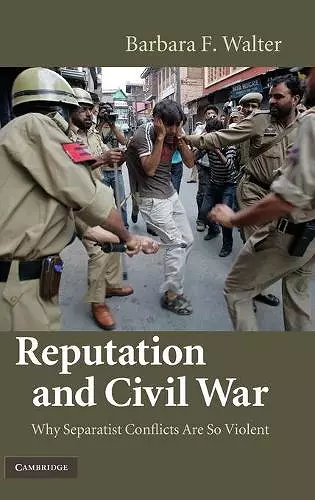Reputation and Civil War
Why Separatist Conflicts Are So Violent
Format:Hardback
Publisher:Cambridge University Press
Published:27th Aug '09
Currently unavailable, and unfortunately no date known when it will be back
This hardback is available in another edition too:
- Paperback£32.00was £32.00(9780521747295)

Attempts to resolve why self-determination disputes between governments and ethnic minorities so often result in civil war.
Why do self-determination disputes between governments and ethnic minorities often end in war? Barbara Walter argues it is because governments want to build tough reputations. Through a wide array of evidence, she demonstrates the importance of reputation building for governments in multiethnic countries and how governments consciously invest in it.Of all the different types of civil war, disputes over self-determination are the most likely to escalate into war and resist compromise settlement. Reputation and Civil War argues that this low rate of negotiation is the result of reputation building, in which governments refuse to negotiate with early challengers in order to discourage others from making more costly demands in the future. Jakarta's wars against East Timor and Aceh, for example, were not designed to maintain sovereignty but to signal to Indonesia's other minorities that secession would be costly. Employing data from three different sources - laboratory experiments on undergraduates, statistical analysis of data on self-determination movements, and qualitative analyses of recent history in Indonesia and the Philippines - Barbara F. Walter provides some of the first systematic evidence that reputation strongly influences behavior, particularly between governments and ethnic minorities fighting over territory.
'… Walter shows that much of the answer lies in whether a state is faced with multiple potential challenges and therefore has to defend its reputation for holding firm. Rarely has such an important puzzle been so well explained.' Robert Jervis, Columbia University
'Barbara Walter strikes again! Her first book altered our thinking and our policies about civil war termination, showing that separating armies in civil wars incurs commitment problems that make these wars more difficult to end than interstate wars. This book, her second major work on civil wars, is equally stunning. Relying on theory, case studies, statistical and experimental analysis, it shows how reputation problems lead highly fragmented states to be more bellicose in the face of separatist rebellion that less fragmented states. Once again, Walter's work will impress academics and reframe public policy.' David D. Laitin, Stanford University
'… Barbara Walter makes an important contribution to debates in international relations as well as to the study of civil war.' Robert O. Keohane, Princeton University
'… the value of this book is the recognition of the importance of including future parties and future stakes in the models of bargaining and civil war. … [It] … provides an excellent study showing that when governments are facing movements seeking autonomy, they make strategic decision and invest in reputation-building.' International Affairs
ISBN: 9780521763523
Dimensions: 235mm x 157mm x 18mm
Weight: 560g
270 pages